By Jason and Alisha Hagey
Following in the spiritual footsteps of Lorraine Hansberry’s A Raisin in the Sun and Tracy Letts’ August: Osage County, Pioneer Theatre Company’s (PTC) production of Joshua Harmon’s Prayer for the French Republic is a riveting, multi-layered exploration of history, identity, and survival all focused on a single family. The Parisian living room of the Benhamou family draws us in on the cusp of the 2017 French presidential election as anti-Semitic attacks rise. The story is told by Patrick Salomon, himself a secularized French Jew, relating the struggles of the Benhamou family, the effects of generational trauma, and the cyclical nature of marginalization. Prayer for the French Republic is a profound meditation on resilience, fear, and the questions of identity that bind us all.
Joshua Harmon’s (Playwright) play moves across generations, interweaving a romanticized Salomon family history with the Benhamou’s present and the broader societal and historical contexts. He uses the Salomon and Benhamou family as a microcosm to explore his immense themes. He juxtaposes the different generations’ experiences with anti-Semitism, loyalty, and fear. Harmon deftly reveals how past events resonate in the present, and he does so with sharp, intelligent dialogue, emotional depth, and an unforced social critique. If this weren’t enough, Harmon also balances these heavy and heady themes with brilliant humor that lightens the emotional weight of his story. The humor isn’t frivolous but underscores the strength and empathy of his characters.
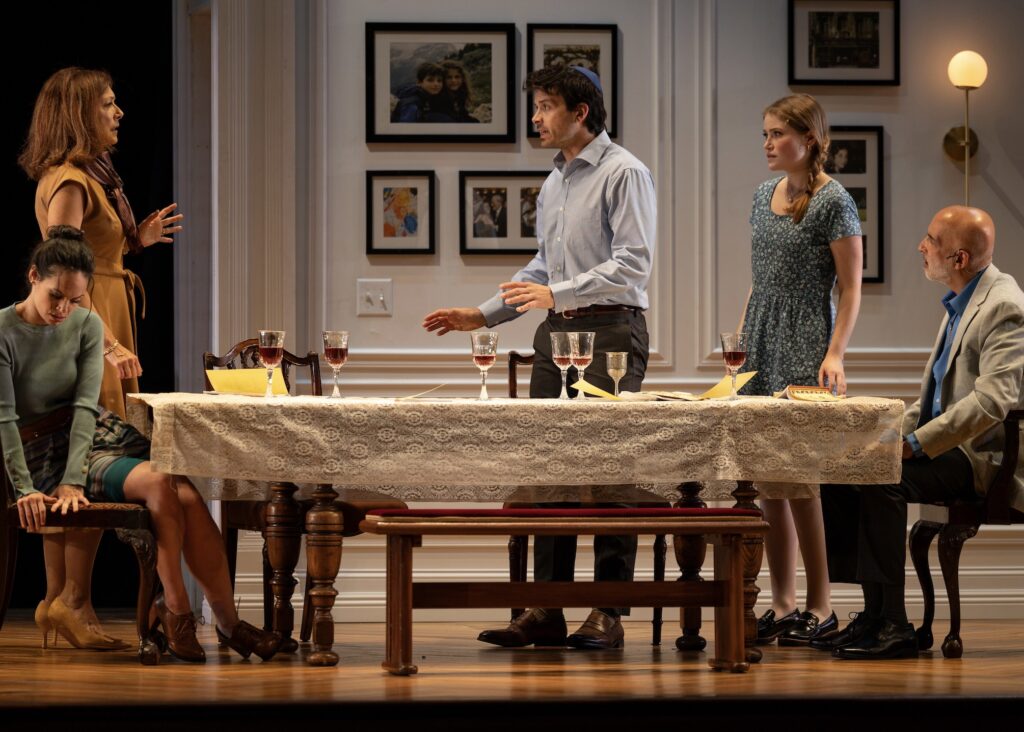
Patrick’s sister, the Benhamou family matriarch, Marcelle, is the story’s central figure. Charles, her husband, hastily left Algeria as a child after his family suffered persecution for their Jewish heritage. He ended up in France, where he and Marcelle eventually married. Together, they have a daughter, Elodie, and a son, Daniel. The play begins with the visit of a distant American relative, Molly, who becomes a stand-in for the audience. Through her presence, she reveals the deep-seated issues within the family and provides a catalyst for examining more significant ideas of belonging, identity, and otherness.
The incredible cast of this production powerfully makes Harmon’s ideas reverberate. With uncanny mastery, Judith Lightfoot Clarke (Marcelle Salomon Benhamou) makes Marcelle real and relatable. She never delivers a gesture, expression, or line that is theatrical or overwrought. Clarke inhabits her character with grace, poise, and vulnerability. Likewise, Alok Tewari (Charles Benhamou) is sincere and authentic. His performance exudes every emotion – fear or love – with a profound understanding and compassion.
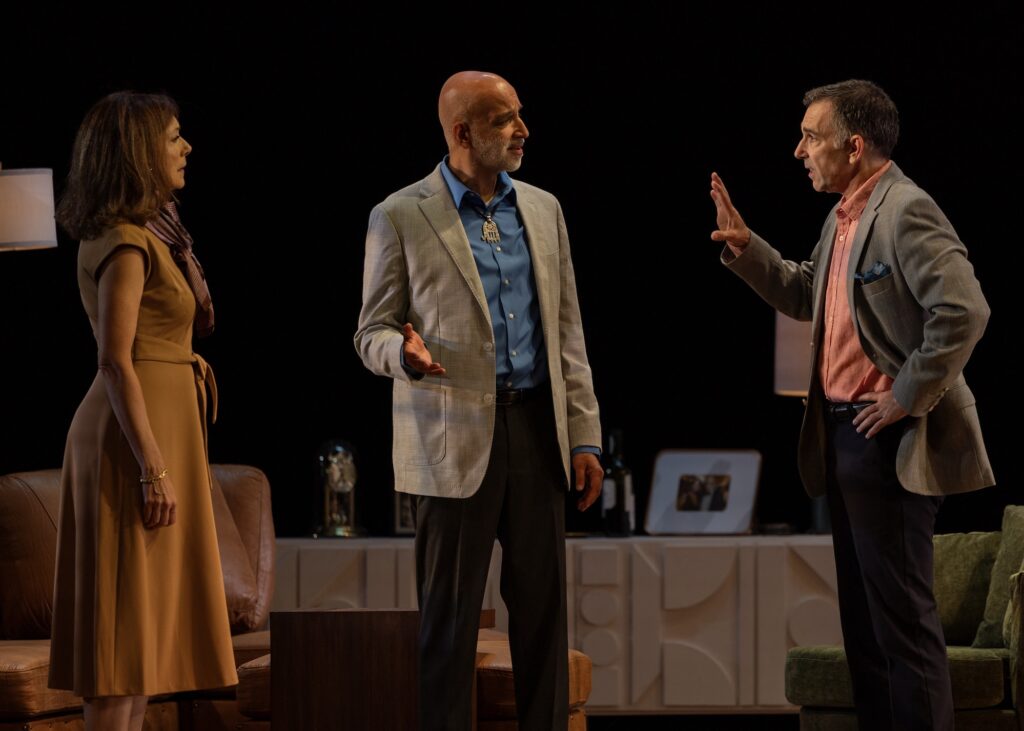
As ghosts of the past and specters of the present, Joel Leffert (Pierre and Adolphe Solomon), Jayne Luke (Irma Salomon), and Matthew McGloin (Lucien Salomon) are the embodiment of the trauma that haunts the family and the Jewish community at large. Leffert plays a double role as the great-grandfather and father of the present-day Salomon siblings. His portrayals are commendable for their gentle and genuine nature. Luke is a unique figure on the stage. Hers is a towering performance despite her short stature. Luke captures the audience’s sympathies and holds it. She is powerful in her monologue toward the end of the play. McGloin’s role as the troubled but ever-optimistic man who made it through the Polish concentration camps is believable and beautiful.
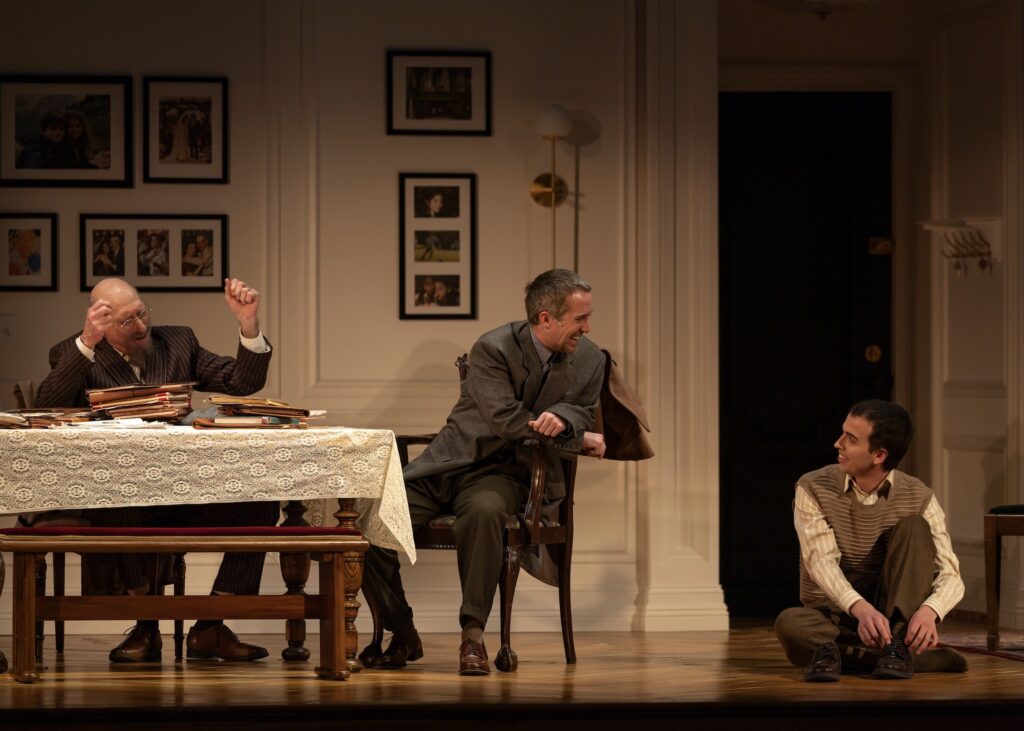
The younger cast is no less impressive. Japhet Balaban (Daniel Benhamou), Maggie Goble (Molly), and True Leavitt (Young Pierre Salomon) provide outstanding performances. Balaban and Goble are especially rich in their chemistry. Leavitt’s heartfelt characterization of the younger incarnation of Pierre Salomon shows how communal pain can occupy the soul.
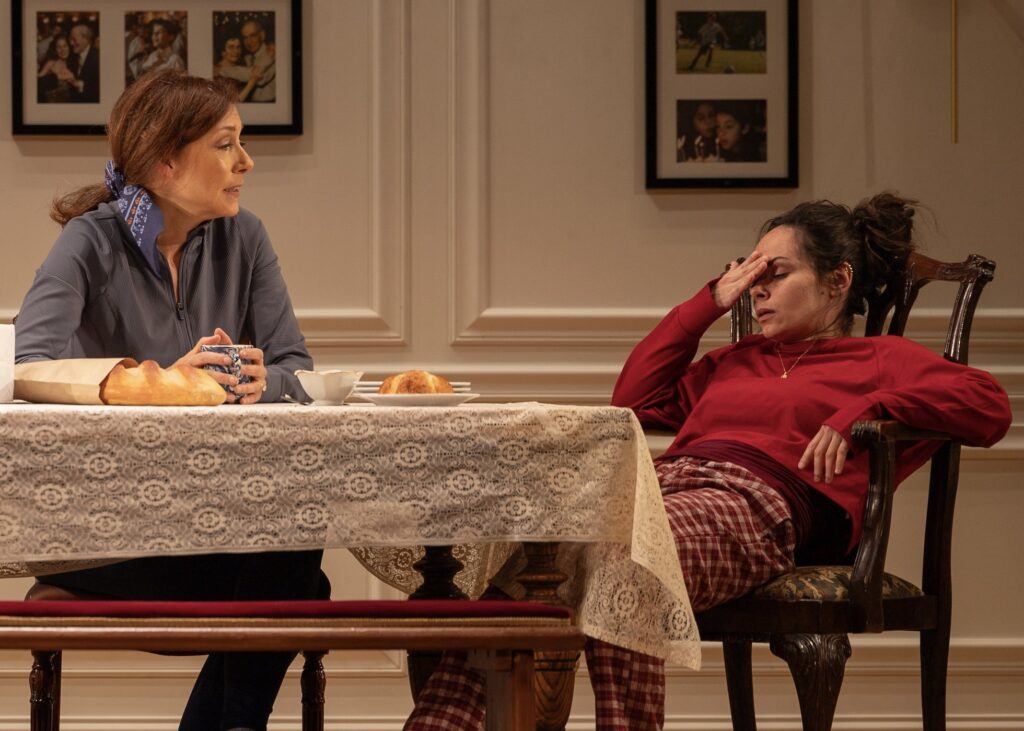
Judith Lightfoot Clarke and Kim Taff; Photography by BW Productions
Whether moping across the floor in her pajamas or spouting ideological hypocrisies from the dining room, Kim Taff (Elodie Benhamou) is the unexpected unicorn cast member. At first, Taff comes across as the stereotype of young adult cynism, but as the play progresses, her interpretation of Elodie gains greater nuance and more complex realism. Taff’s diatribe at the club with Molly very nearly steals the show.
As the proverbial binding glue of the whole production, Robert Mammana (Patrick Salomon) is remarkable. His presence on stage is mesmerizing. Whether playing the piano, singing bars from Irving Berlin’s “What’ll I Do,” conveying the story and its larger context, or performing his role in the family narrative, Mammana is exceptional. He flawlessly ties together the world of Prayer for the French Republic with a polish and human touch that is unforgettable and indispensable.’
Impossible to ignore, the design team for Prayer for the French Republic produces a palpable vision. The scenic design requires a versatile space changing between the past and present. Bryce Cutler (Scenic Designer) gives that versatility in his Parisian apartment space and makes it stylish and iconic. The way the whole apartment stretches into the heavens subtly connects the temporal and mortal to the divine and ideal. This design produces an interesting, compelling contrast to what is happening in the apartments. The breathtaking lighting of José Santiago (Lighting Designer) enhances the scenic design. Santiago’s design is rich with metaphor and realism.
I haven’t seen a costume design with so much color subtext in a long time, as Susan Branch Towne (Costume Designer) brings to this production. Throughout the runtime, the palette changes and morphs with the psychological and societal implications of the family. Towne’s design is revelatory. Each character and each designer follows their journey with nods to the understanding of the French flag. Blue: Associated with the natural world, calm, and melancholy. White: Purity, peace, and the divine. Red: Danger, anger, bloodshed, and love.
At the helm of PTC’s production, Karen Azenberg (Director) crafts a kaleidoscopic narrative that sometimes transcends space and time. With her indelible, intricate, and illuminating direction, Azenberg enraptures her audience with the talents of her cast and design team in an absolutely genius way. Prayer for the French Republic is a dialogue-driven, naturalistic conversation play. Azenberg constructs the portrayal as a visual banquet that hints at the characters’ deeper insecurities, resentments, and affections without stating them explicitly. Azenberg’s prowess is in the details. For instance, there is a scene where Charles, Daniel, and Molly are making donuts. As an illustration of Molly’s time and ingratiation into the family, Molly knows where to find or put away everything in the kitchen. She isn’t the focus of the scene. This moment reflects the level of detail Azenberg employs in crafting the show. Every scene crackles with interest and pulsates with liveness. In short, Azenberg makes the diegetic reality breathe.
Pioneer Theatre Company’s Prayer for the French Republic is timely and timeless. It is hard to disengage the story’s themes and events from the present day. We are in an election year in the United States with divisive politics and social unrest. As Elodie says, “The world is on fire.” Through France’s political and social lens, we see ourselves. And, because this play also elucidates the iterative quality of events, Prayer for the French Republic resonates with startling historical significance. None of the present is new or unprecedented. Prayer for the French Republic brilliantly reminds us that today builds on the past and is merely an extension of centuries, even millennia, of the same. What we are experiencing today is nothing new but the usual business on repeat. The question is: what are we going to do about it?
Prayer for the French Republic runs approximately 3 hours. This includes two 10-minute intermissions.
Pioneer Theatre Company presents Prayer for the French Republic by Joshua Harmon
PTC’s Simmons Pioneer Memorial Theatre
300 South 1400 East, Salt Lake City
October 25-November 9, 2024
Monday – Thursday, 7:00 PM
Friday and Saturday, 7:30 PM
Saturday, 2:00 PM
ASL-Interpreted Performance: Monday, November 4 at 7:00 PM
PRICES: $44 – $57 in advance; $5 more when purchased on day of show
Students K – 12 or ages 5-18 are half-price Monday – Thursday
Curtain Call for All (“pay what you can”) performance: Thursday, October 31
Box Office: 801-581-6961
Open 10:00 AM – 6:00 PM, Monday – Friday
Pioneer Theatre Company
Pioneer Theatre Company Instagram
Pioneer Theatre Company Facebook
Study Guide
PANEL DISCUSSION WITH SPECIAL GUESTS Following the matinee on Saturday, October 26, PTC will host a panel discussion featuring several community experts. These guests are Vanessa Brutsche (Assistant Professor of French at the University of Utah), Dr. Alli Martin (Director of Social-Emotional Learning for Salt Lake City School District), and the play’s director Karen Azenberg. The conversation, moderated by the play’s dramaturg Alexandra Harbold, will explore the concepts of identity, belonging, and the universality of other themes featured in Prayer for the French Republic. The discussion will begin at 5:00 PM on October 26 and is open to the public.
LOGE GALLERY During the run of Prayer for the French Republic, Pioneer Theatre Company will present “Contrasts in Canvas” in the Loge Gallery. The exhibit will feature large and small works from the Intermountain Society of Artists. Select works will be available for purchase through the PTC Box Office.

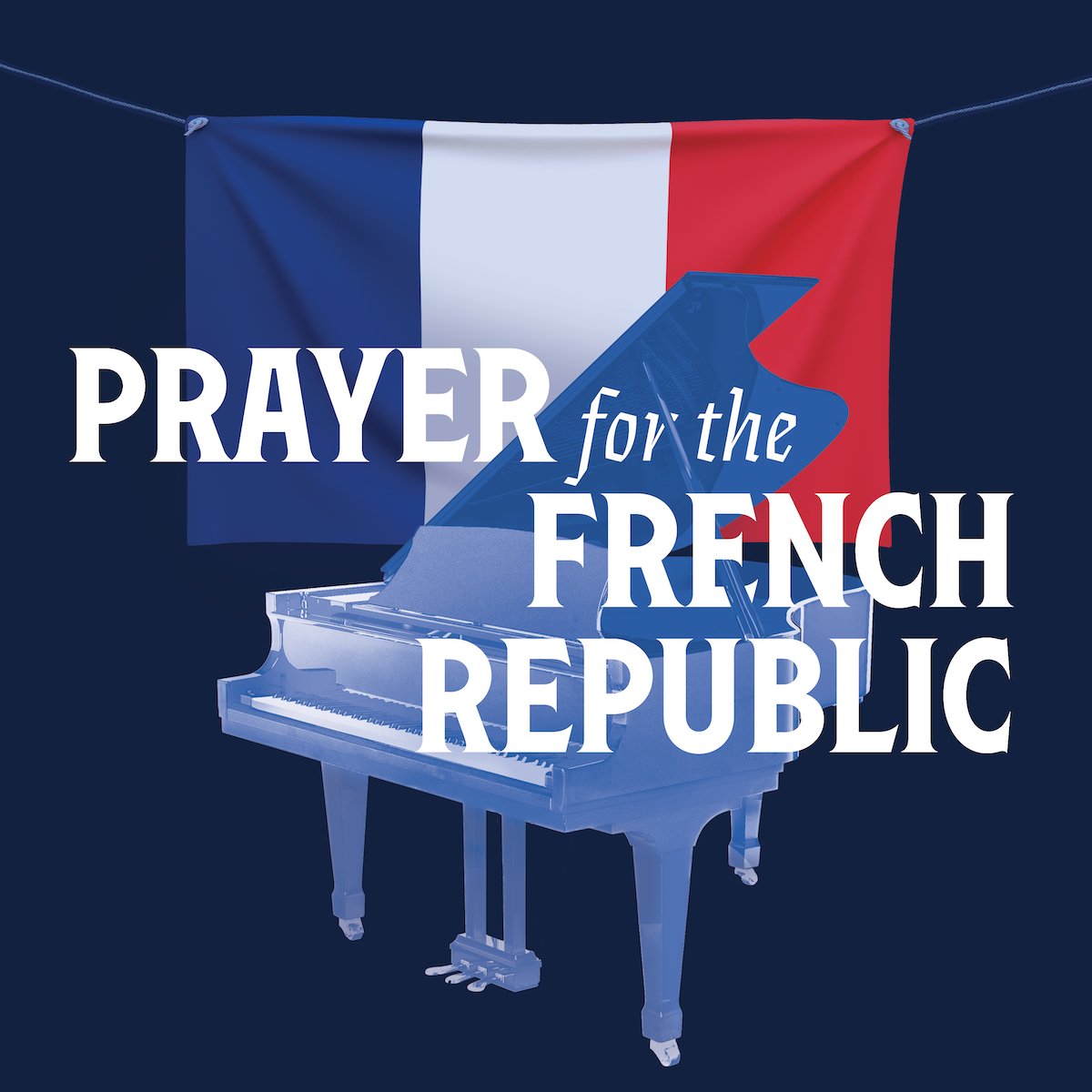
0 Comments